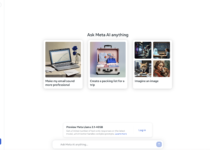How AI Fuels Digital Marketing
SEO, Content Generation, and Audience Targeting
The world of digital marketing is constantly evolving, and artificial intelligence (AI) is at the heart of this transformation. By leveraging AI, marketers can optimize SEO strategies, generate content at scale, and accurately target the right audience. In this post, we’ll explore how AI is revolutionizing digital marketing through these three critical areas, helping businesses increase visibility, engagement, and conversions.
1. SEO Optimization: Boosting Search Engine Rankings with AI
Search engine optimization (SEO) is crucial for any business that wants to be discovered online. With AI’s ability to analyze vast amounts of data and recognize patterns, it’s transforming SEO strategies, making them more efficient and effective.
- AI-Powered Keyword Research: AI tools like Moz and SEMrush analyze search data, trends, and competition to suggest high-performing keywords. AI can also identify long-tail keywords that human researchers might overlook, expanding a brand’s reach.
- Content Optimization: AI-powered platforms such as Surfer SEO help marketers optimize content by analyzing the top-ranking pages and identifying which keywords, headings, and media types boost SEO. These tools can even analyze search intent, ensuring content aligns with what users are actually looking for.
- Automated SEO Audits: AI enables automated audits to identify SEO issues — like broken links, slow-loading pages, and missing meta descriptions — allowing digital marketers to quickly fix issues that might be holding back website rankings.
Example: MarketMuse, an AI-driven content research and SEO tool, helps content marketers craft content that ranks higher by analyzing content gaps and providing recommendations for optimizing articles.
2. Content Generation: Scaling Content Creation with AI
Creating fresh, engaging content is time-consuming, but AI is changing that by enabling marketers to generate high-quality content at scale.
- Automated Blog Writing: Tools like Jarvis (now Jasper) use AI to generate blog posts, product descriptions, social media updates, and more, based on brief inputs. These AI writing assistants produce readable content quickly, saving marketers valuable time.
- Personalized Content: AI can analyze user behavior and preferences to create personalized content that resonates with individuals. By studying patterns in browsing habits, AI helps marketers tailor content to specific audience segments.
- Content Repurposing: AI helps repurpose content across multiple formats (e.g., turning a blog post into a video script or social media snippets), making it easier to maintain a consistent content strategy.
Example: Copy.ai is a tool that generates marketing copy for ads, emails, and social media posts. By using AI, businesses can create multiple variations of content, experimenting with different approaches to see which one performs best.
3. Audience Targeting: Reaching the Right People with Precision
AI is taking audience targeting to the next level by using data to identify the most relevant and profitable customer segments.
- Behavioral Analysis: AI can track user behavior across digital channels (e.g., websites, social media, email) to understand their preferences and intent. By analyzing this data, AI helps marketers create targeted campaigns tailored to each customer.
- Predictive Analytics: AI models can predict which customers are most likely to convert based on historical data. This allows marketers to optimize ad spend and focus on leads that are more likely to yield returns.
- Dynamic Ad Targeting: AI can optimize ads in real-time, adjusting targeting based on user behavior and interactions. It ensures that the right ad is shown to the right person at the right time, increasing the likelihood of conversion.
Example: Facebook’s AI-powered Ads analyze vast amounts of data on user behaviors and interactions to deliver highly targeted ads. By predicting which content will engage users, Facebook’s AI helps businesses achieve better ROI on ad spend.
Benefits of AI in Digital Marketing
The integration of AI into digital marketing comes with a wealth of advantages, including:
- Improved Efficiency: By automating time-consuming tasks such as keyword research, content generation, and SEO audits, marketers can focus on higher-value activities.
- Enhanced Personalization: AI allows marketers to create tailored experiences for their audience, increasing engagement and conversions.
- Increased ROI: With predictive analytics and precise audience targeting, businesses can optimize their marketing strategies, ensuring that every dollar spent on ads is put to good use.
For More on AI in Marketing
If you’re interested in discovering more ways that AI is transforming industries, be sure to check out our previous post, How AI Fuels E-Commerce Growth: Customer Personalization, Dynamic Pricing, and Sales Forecasting, which dives into how AI is reshaping the e-commerce industry.
AI is revolutionizing digital marketing by making SEO more efficient, simplifying content creation, and enabling precise audience targeting. By embracing AI tools and technologies, businesses can stay ahead of the competition, boost engagement, and improve conversion rates.
To stay up-to-date with AI’s impact across various sectors, subscribe to our blog and never miss a post.
How have you seen AI impact your digital marketing strategy? Share your experiences and examples in the comments below!

